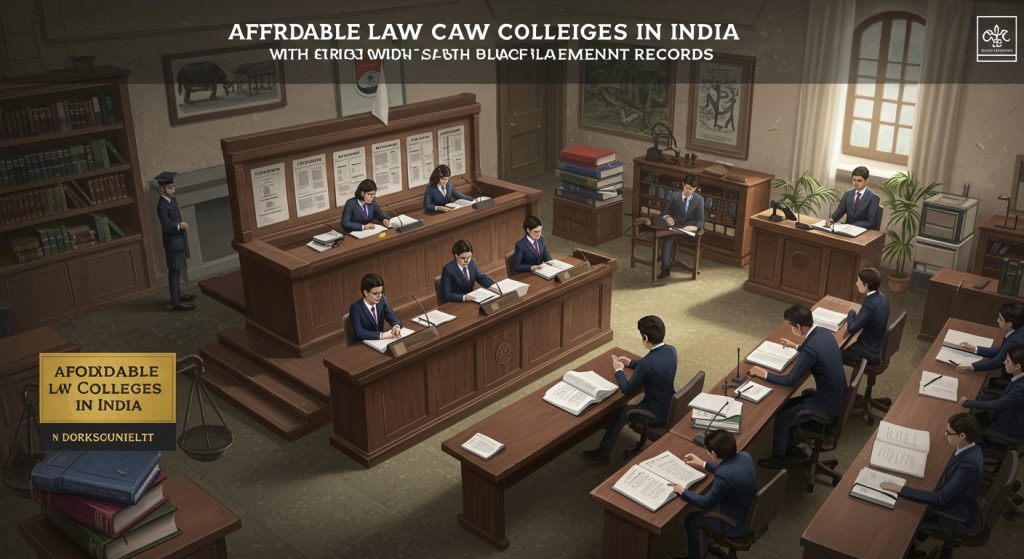Introduction
The dream of becoming a lawyer is alive and well in India, but the price tag of a law degree can sometimes feel like a major obstacle. However, don’t let the perceived cost deter you! There are indeed affordable pathways to legal education, and a good law degree doesn’t have to break the bank. Many excellent colleges offer quality programs without exorbitant fees.
For many, understanding where to even begin searching for such programs proves difficult. The legal landscape is constantly evolving, and keeping up with the best options can be tough. Therefore, we’ve compiled a list of some of the top colleges in India that provide high-quality law degrees at more accessible prices. This should, hopefully, give you a starting point.
In this blog post, we’ll delve into these institutions, highlighting what makes them stand out. We will explore aspects such as faculty expertise, curriculum relevance, and placement opportunities. In addition, we will try to provide a realistic overview of what you can expect from each college, so you can make an informed decision about your legal future. Let’s get started, shall we?
Affordable Law Degrees: Top Colleges in India for Aspiring Lawyers
So, you want to be a lawyer in India? That’s awesome! But let’s be real, law school can be expensive. The good news is, there are some fantastic colleges that offer quality legal education without breaking the bank. I mean, who wants to start their career buried in debt, right?
Navigating the world of law colleges can feel like a legal maze itself. That’s why I’ve put together this guide to highlight some of the most affordable and reputable law programs in India. Consequently, you can make an informed decision about your future legal career.
Why Affordability Matters in Law School
Before we dive into the list, let’s quickly address why affordability is crucial. Think about it: a lower tuition fee means less student loan debt after graduation. This gives you more financial freedom to pursue your passions, maybe start your own practice, or even take on pro bono cases without the pressure of massive repayments. Plus, a strong foundation is essential, whether you are aiming for corporate law or international business law.
Top Affordable Law Colleges in India (In No Particular Order!)
Alright, let’s get to the good stuff! Here are some colleges known for their relatively lower fees and quality education:
- National Law Universities (NLUs): While some NLUs can be pricier, many offer scholarships and fee waivers. Consider campuses in locations like Patna, Ranchi, or even some of the newer ones, which often have lower overall costs.
- Government Law Colleges: These are generally the most affordable options. Government Law College, Mumbai, for example, is a classic.
- State University Law Departments: Many state universities have law departments that offer excellent programs at reasonable costs.
Factors to Consider Besides Cost
Okay, so price isn’t everything, right? You should also think about a few other things before deciding where to apply. For instance, consider:
- Faculty: Are the professors experienced and knowledgeable? Do they have a good reputation in the legal community?
- Curriculum: Does the program offer specializations you’re interested in? Are there opportunities for practical experience, like moot court or internships?
- Location: Do you want to study in a big city or a smaller town? Think about where you’d like to live and work after graduation, too.
- Placement Record: What kind of jobs do graduates typically get? Does the college have a good career services department that can help you find internships and jobs?
Tips for Finding Affordable Law Programs
Finding the right law school for you is a journey, not a sprint. Here’s what you can do to make things easier:
- Research exhaustively: Use websites like the Bar Council of India and university ranking sites to find potential colleges.
- Check official websites: Always verify fee structures and scholarship information directly on the college’s website.
- Talk to current students and alumni: Get firsthand insights into the program and its affordability.
- Explore scholarship options: Look for government scholarships, private scholarships, and even scholarships offered by the colleges themselves.
Ultimately, choosing a law school is a big decision, and cost is just one piece of the puzzle. By carefully considering all the factors and doing your research, you can find an affordable program that sets you up for a successful legal career. Good luck!
Conclusion
So, you’re thinking about law school, huh? It’s a big decision, I know. Finding affordable options can feel like a challenge, but hopefully, this gave you a clearer picture of some of the top colleges in India that won’t break the bank. Remember, a great legal career isn’t always about the most expensive school; it’s about the dedication and hard work you put in.
Ultimately, choose the college that aligns with your goals and, importantly, your budget. Getting a law degree is an investment and, for example, if you’re also thinking about business, maybe you’d consider looking at Public vs Private MBA Programs: Which is Right for Your Business Management Career? . Good luck with your journey to becoming a lawyer! It’s going to be tough, but definitely worth it.
FAQs
Okay, so I really want to be a lawyer, but law school can be crazy expensive! Are there actually good, affordable law schools in India?
Absolutely! You might be surprised, but there are some fantastic institutions in India offering quality law degrees without breaking the bank. Think government-funded universities and some private colleges with reasonable fee structures. It’s all about doing your research and prioritizing what’s important to you – like faculty quality, placement rates, and the specializations they offer.
What kind of fees are we talking about for ‘affordable’? Give me a ballpark figure.
Good question! ‘Affordable’ is relative, right? Generally, you’re looking at annual fees anywhere from ₹20,000 to ₹1,50,000 (or even slightly more in some cases) for the entire course. Keep in mind this is a rough estimate and depends heavily on the specific college and whether it’s government or private. Tuition fees can change, so always double-check the official college website.
Besides cost, what else should I look for when choosing a law school?
Cost is crucial, but don’t let it be the ONLY factor! Consider things like the faculty’s experience and reputation, the curriculum (does it align with your interests?) , the college’s placement record, and the overall learning environment. Also, think about location – do you prefer a big city or a smaller town? The National Institutional Ranking Framework (NIRF) rankings can be a good starting point for comparing institutions.
Are these affordable law schools any good, academically speaking? Will I be getting a subpar education?
Not at all! Many affordable law schools have excellent faculty and a rigorous curriculum. Some are even quite competitive to get into. The key is to look at alumni success stories, faculty publications, and the overall reputation of the institution. Don’t equate ‘affordable’ with ‘low quality’ – often, it just means they’re publicly funded or have a different funding model.
What entrance exams do I need to worry about?
Ah, the entrance exam hurdle! CLAT (Common Law Admission Test) is the big one, especially if you’re aiming for the National Law Universities (NLUs). However, many state-level universities and private colleges have their own entrance exams. So, you’ll need to research the specific requirements for each college you’re interested in.
Okay, so give me a starting point. Name a few colleges that generally fit the bill of ‘affordable and good’.
Alright, here are a few to get you started, though it’s always best to research and verify everything yourself: Government Law College (Mumbai), Faculty of Law, Banaras Hindu University (BHU), and some of the state-run universities offering law degrees. Also, explore colleges affiliated with state universities in major cities – you might find some hidden gems! Remember to check their current fee structure and accreditation.
What about scholarships and financial aid? Are there any options for that?
Definitely! Many colleges offer scholarships based on merit or financial need. Look into government scholarships as well – there are often programs designed to support students from specific backgrounds. Also, don’t hesitate to contact the college’s financial aid office directly. They can provide information on available scholarships, loans, and payment plans.



